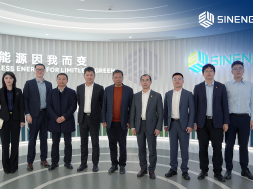
VRB Energy Breaks Ground on 100MW / 500MWh Flow Battery And Gigafactory in China – EQ Mag Pro
An official ceremony was held in Hubei Province, China, as work began on the first phase of a 100MW / 500MWh vanadium redox flow battery (VRFB) system which will be paired with a gigawatt of wind power and solar PV generation.
Canada-headquartered flow battery energy storage system manufacturer VRB Energy is constructing the project, beginning with a 100MWh initial phase. Alongside it will be 500MW of distributed rooftop solar installations. Commissioning is scheduled to take place before the end of 2022.
Toronto Stock Exchange-listed minerals and energy company Sparton Resources, an investor in VRB Energy through one of its subsidiaries, VanSpar Mining, announced the 29 August ceremony to mark the start of construction in a press release yesterday. The ceremony was hosted at Xiangyang New High-Tech Park in Hubei by private-public development company Hubei Green-Move Zhongvan New Energy (Green Move ZF).
Flow battery cell stacks at VRB Energy’s demonstration project in Hubei, China.
Among others in attendance were local Xiyang Municipality Senior Party and Government leaders and representatives from the Hubei State Power Investment Group — which part-owns Green Move ZF along with the renewables-plus-storage project’s main investor, Hubei Pingfan Ruifeng New Energy Technology.
Construction of the large-scale project follows on from a successful 3MW / 12MWh demonstration which was combined with 3MW of local solar PV. VRB Energy CEO Dr Huang Mianyan, who has previously noted that Hubei is rich in vanadium resources which will provide electrolyte materials for the massive system, said that initial demonstration project is “working well”.
“The operation has fully confirmed the huge application value and market prospects of VRB Energy’s storage technology and will promote the grid connection and on-site consumption of renewable energy.”
“The opening ceremony marks the official construction stage of the 100MWh all-vanadium flow battery energy storage project, which will accelerate the promotion of energy storage using vanadium flow battery energy systems in Hubei,” Mianyan said.
A framework agreement signed in March for the project between VRB Energy and its local stakeholder partners also paved the way for a 1,000MW per annum VRFB ‘gigafactory’ to be built in the region, as well as an R&D centre.
According to Sparton Resources’ press release, the entire 1GW of solar and wind with the 500MWh of flow battery capacity will cost around RMB 9.32 billion (US$1.44 billion), with the first phase requiring investment of around RMB4.32 billion (US$667 million).
VRB Energy’s technology was also selected recently for installation at a Chinese government scientific facility to help develop China’s carbon neutral policies, with a 125kW / 500kWh unit to be used at China State Power Corporation’s new National Photovoltaic and Energy Demonstration Experimental Center in Daqing, northeast China.
Elsewhere, the company also netted a recent investment worth US$24 million from BCPG, a renewables company headquartered in Thailand.
China’s megaprojects could lead the way
The project is part of China’s national Carbon Neutral and Carbon Peak Strategy. An even bigger VRFB plant is under construction in Dalian Province by a Chinese company, Rongke Power, with 200MW rated output and 800MWh capacity.
While there has been growing interest in vanadium flow batteries around the world, with manufacturers springing up in the US, UK, Germany and Australia, in terms of downstream demand, the handful of (very) large-scale projects China has been pushing to support since 2017 dwarf most of the rest of the world’s end-markets — so far.
In a recent interview for our quarterly journal, PV Tech Power, Erik Sardain, an analyst with critical minerals intelligence group Roskill said that if China’s VRFB market takes off and helps drive the country towards its 2060 carbon neutrality target while setting up a significantly scaled industry, the rest of the world could follow.
“I believe that the VRFB story is going to be driven by China, because it’s not only based on economics, it’s also based on politics. Because if the Chinese government says, “Let’s go for it,” then they will go for it,” Sardain said.
“If it’s successful, China is going to show the way. And basically the rest of the world is going to follow after that.”

















